新编实用英语综合教程2unit-1-教案
Unit1 Invitation Etiquette 新编实用英语综合教程2
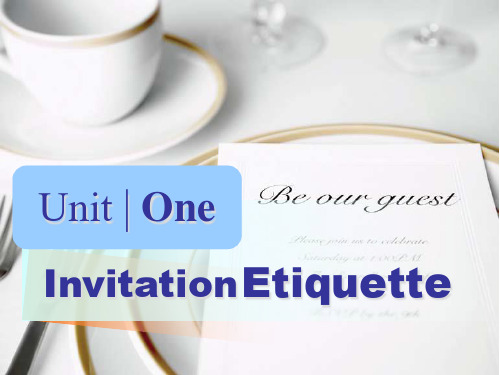
● Refer to the Data Bank in the Workbook for more relevant expressions.
Back
Unit | One
Studying Invitation Cards and Letters
Study and Imitate 3 Invitation cards are often used for inviting people. Now let’s read the following invitation cards and letters and try to use the information in them in your face-toface talks.
Back
Unit | One
Back
Unit | One
Following Sample Dialogues
Imitate and Perform 4 Read the following sample dialogues and try to perform your own tasks.
1) Inviting Friends to a Party Wang: Hello, William. What are you doing tomorrow evening? William: Tomorrow evening? Nothing special, I was thinking of watching TV. Wang: Drag yourself away from television for a change. I’m having a few friends to have a dinner party tomorrow to celebrate my daughter’s birthday. How would you like to join us? William: Great. That would be super. Congratulations! Wang: Thank you. How about eight o’clock? Is that OK? William: Oh yes, fine. Would it be alright if I brought somebody with me? Wang: Yes, of course. William: OK. Fine. Do you want me to bring something to drink? Red wine or white? Wang: Um, white wine, if you feel you must bring something. But it’s not necessary. William: I’ll do that. Well, indeed, thank you very much for inviting me. Wang: My pleasure. Back William: I’ll be along at eight. Looking forward to it. Wang: Yeah, see you then. Unit | One
新编实用英语综合教程2 教案
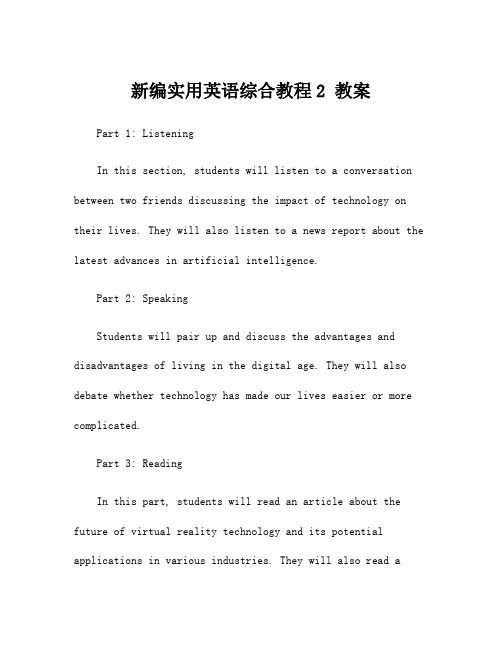
新编实用英语综合教程2 教案Part 1: ListeningIn this section, students will listen to a conversation between two friends discussing the impact of technology on their lives. They will also listen to a news report about the latest advances in artificial intelligence.Part 2: SpeakingStudents will pair up and discuss the advantages and disadvantages of living in the digital age. They will also debate whether technology has made our lives easier or more complicated.Part 3: ReadingIn this part, students will read an article about the future of virtual reality technology and its potential applications in various industries. They will also read ashort story about a robot that learns to think and feel like a human.Part 4: WritingStudents will practice writing a persuasive essay on the topic "Is technology making us smarter or lazier?" They will need to provide evidence and examples to support their argument.Unit 2 Social MediaPart 1: ListeningStudents will listen to a podcast about the impact of social media on mental health and relationships. They will also listen to a discussion about the pros and cons of using social media for activism.Part 2: SpeakingIn this section, students will participate in a group discussion on the topic "Should social media platforms beregulated?" They will need to express their opinions and listen to their classmates' viewpoints.Part 3: ReadingStudents will read an article about the rise ofinfluencer marketing on social media platforms. They will also read a blog post about the benefits of using social media for networking and career advancement.Part 4: WritingIn the writing task for this unit, students will create a social media campaign for a fictional company. They will need to come up with a creative strategy to promote the company's products or services on different social media platforms.Unit 3 Online SecurityPart 1: ListeningStudents will listen to a cybersecurity expert discussing common online security threats and how to protect againstthem. They will also listen to a news report about a recent data breach at a major company.Part 2: SpeakingIn this section, students will participate in role-plays where they act out different online security scenarios. They will need to practice giving advice on how to stay safe online and protect personal information.Part 3: ReadingStudents will read an article about the importance of using strong passwords and two-factor authentication to secure online accounts. They will also read a case study about a social engineering attack that led to a data breach.Part 4: WritingFor the writing task in this unit, students will compose an email to a friend explaining the importance of online security measures. They will need to provide tips andrecommendations for staying safe online and avoiding common scams and phishing attempts.。
新编实用英语综合教程第二册第一单元
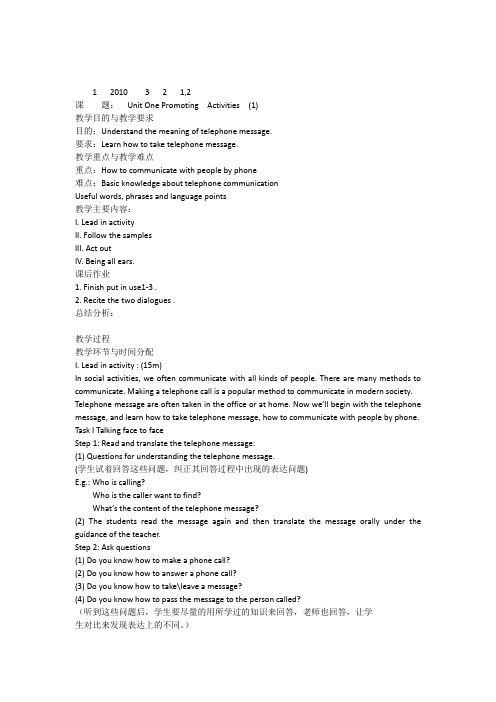
1 2010 32 1,2课题:Unit One Promoting Activities (1)教学目的与教学要求目的:Understand the meaning of telephone message.要求:Learn how to take telephone message.教学重点与教学难点重点:How to communicate with people by phone难点:Basic knowledge about telephone communicationUseful words, phrases and language points教学主要内容:I. Lead in activityII. Follow the samplesIII. Act outIV. Being all ears.课后作业1. Finish put in use1-3 .2. Recite the two dialogues .总结分析:教学过程教学环节与时间分配I. Lead in activity : (15m)In social activities, we often communicate with all kinds of people. There are many methods to communicate. Making a telephone call is a popular method to communicate in modern society. Telephone message are often taken in the office or at home. Now we’ll begin with the telephone message, and learn how to take telephone message, how to communicate with people by phone. Task I Talking face to faceStep 1: Read and translate the telephone message:(1) Questions for understanding the telephone message.(学生试着回答这些问题,纠正其回答过程中出现的表达问题)E.g.: Who is calling?Who is the caller want to find?What’s the content of the telephone message?(2) The students read the message again and then translate the message orally under the guidance of the teacher.Step 2: Ask questions(1) Do you know how to make a phone call?(2) Do you know how to answer a phone call?(3) Do you know how to take\leave a message?(4) Do you know how to pass the message to the person called?(听到这些问题后,学生要尽量的用所学过的知识来回答,老师也回答,让学生对比来发现表达上的不同。
新编实用英语综合教程2第四版-PPT教学课件

● Refer to the Data Bank in the Workbook for more relevant expressions.
Back
7 Unit | One
Studying Invitation Cards and Letters
Study and Imitate 3 Invitation cards are often used for inviting people. Now let’s read the following invitation cards and letters and try to use the information in them in your face-toface talks.
Back
6 Unit | One
Acting out the Tasks
Speak and Perform 2 Work in pairs and act out the tasks by following the above mini-talks. 1 Task: Suggest going skiing with your friend. 2 Task: Invite your friend to go to a concert on Friday evening. 3 Task: Invite your friend to go to the early show of the movie “My Fair Lady”. 4 Task: Decline your friend’s invitation to go dancing next Friday afternoon. 5 Task: Decline your friend’s invitation to go out to dinner.
新编实用英语综合教程2_第一单元
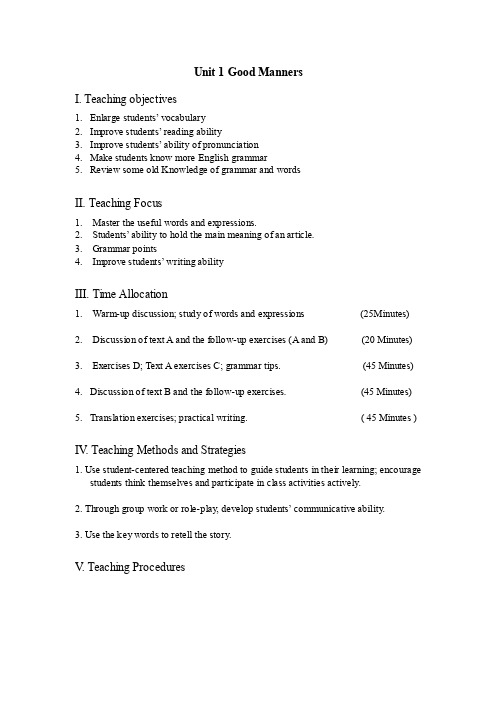
Unit 1 Good MannersI. Teaching objectives1.Enlarge students’ vocabulary2.Improve students’ reading ability3.Improve students’ ability of pronunciation4.Make students know more English grammar5.Review some old Knowledge of grammar and wordsII. Teaching Focus1.Master the useful words and expressions.2.Students’ ability to hold the main meaning of an article.3.Grammar points4.Improve students’ writing abilityIII. Time Allocation1. Warm-up discussion; study of words and expressions (25Minutes)2. Discussion of text A and the follow-up exercises (A and B) (20 Minutes)3. Exercises D; Text A exercises C; grammar tips. (45 Minutes)4.Discussion of text B and the follow-up exercises. (45 Minutes)5.Translation exercises; practical writing. ( 45 Minutes )IV. Teaching Methods and Strategies1. Use student-centered teaching method to guide students in their learning; encouragestudents think themselves and participate in class activities actively.2. Through group work or role-play, develop students’ communicative ability.3. Use the key words to retell the story.V. Teaching ProceduresText A My CustomStep I. Background InformationManners are the standards of conduct which show the actor to be cultured, polite, and refined. They are like laws in that they codify a set of standards for human behavior; yet they are unlike laws in that there is no formal system for punishing misbehavior. They are a kind of norm.Step II. W arm-up Questions:①What changes in manners have taken place according to the article?A perfectly able woman no longer has to act helplessly in public, and a man can drop the outdated courtesies.②Why don’t men have to show outdated courtesies to women now?It is thanks to the women’s liberation.③Is “my wife”happy with “my custom”? Why?Maybe no, because she said “you did it again”when the hostess had gone. It seems that it takes time for women to get used to “my custom”.Step III Part Division of the TextPart 1 (Paragraph 1): As a result of women’s liberation, men no longer have to pay women the old-fashioned courtesies.Part 2 (Paragraph 2-3):The changes in manners between men and women according to an article. Part3 (Paragraph 4-11): “My custom” -- I refuse to trouble women with outdated courtesies andshow my thoughtfulness for them in my own way.Step IV Vocabulary1.custom表示“习惯,风俗”;而customs意思是“海关”,如customs duties“关税,进口税”, customs(海关)与单数动词连用e.g. The article is about how the customs works.Customs is an important organization in developing economies.Derivatives:customary adj.通常的,习惯的,惯例的customer n.顾客,主顾customize v.定做,按客户具体要求制造2.courtesy有两种词性,注意其各自用法不同:courtesy adj.礼节性的;免费的pay a courtesy visit to the new neighbors 对新邻居进行一次礼节性拜访courtesy tickets for the reporters 记者的免费票courtesies n. (pl.) 谦恭有礼,殷勤,有礼貌的行为或言辞Derivatives:courteous adj.有礼貌的,谦恭的courteously adv.有礼貌地discourtesy n.无礼discourteous adj.没有礼貌的, 不谦恭的discourteously adv. 没有礼貌地, 不谦恭地by courtesy of 由于……的好意;蒙……允许;因为,由于e.g. The following pictures are offered by courtesy of Mr. Peterson.3.mannerComparison:manner, method, mode, fashion, waymanner 强调的是行动或步骤具有个性和独特性:e.g. She has a precise, clearly articulated manner of speaking.她讲话具体、清晰。
新编实用英语综合教程二Unit-1-Invitation-EtiquettePPT演示课件
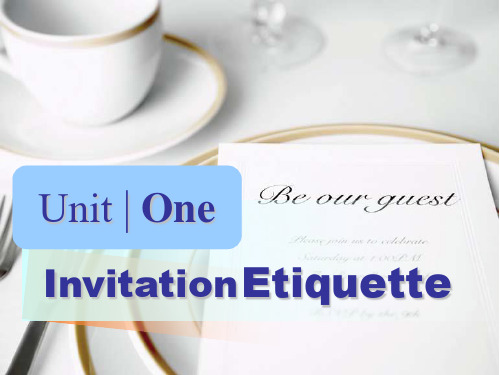
Robert: OK. Thank you for inviting me.
5
Back
Unit | One
3) Inviting friends to a movie Paul: What’re you doing on Saturday night?
Molly: I’m not sure. Why? Paul: Well, I was thinking of asking you to go to a movie with me this weekend.
Unit | One
Invitation Etiquette
1
Unit | One
Unit Goals:
What You Should Learn to Do
1. Make an oral invitation to: invite people to join daily activities invite people to formal occasions
Putting Language to Use
Speak and Complete
Speak and Translate
Speak and Communicate
4
Unit | One
SECTION I Talking Face to Face
Imitating Mini-talks
Speak and Recite
William: Tomorrow evening? Nothing special. Sally: I’m inviting a few friends to my daughter’s birthday party. How would you like to join us?
新编实用英语综合教程2-Unit1InvitationEtiquette教案

Unit 1 Invitation EtiquetteUnit GoalsWhat you should learn to doMake an oral invitation to:Invite people to join daily activitiesInvite people to formal occasionsMake a written invitation(write an invitation card or a letter) for:Personal invitationOfficial occasionsGive a reply to:An oral invitationA written invitationWhat you should know aboutInvitation culture: western and ChineseWord order in a subordinate clauseRequirements:After learning this unit, students should grasp:1. Read and understand the meaning of invitation cards and letters2. How to write invitation cards and letters and remember the patterns of invitation cards and letters3. How to invite people to party or dinner, and how to accept and decline invitations4. The customs of inviting people in different countries5. Important words, phrases and language points in the passageIn our daily life, we need to invite others to dinner or take part in all kinds of parties, so we should know about western custom about invitation.Foreign custom is much stricter than Chinese custom in the matter of replying to invitations. When you receive an invitation you should answer is immediately, saying definitely whether you are able to accept it or not.If the invitation is given by word of mouth, in conversation or at a chance meeting, you should answer at once whether you can come or not. If you cannot give an answer at that time, you may say “ May I let you know this evening ” or some such words. By studying this unit, we will know about how to invite the others, how to accept or decline the invitation, and how to write invitation cards/letters.Section I Talking Face to Face1. Imitating Mini-Talks2. Acting out the Tasks3. Studying Email Information on the Internet4. Following Sample Dialogues5. Putting Language to UseSection II Being All Ears1. Learning Sentences for Workplace Communication2. Handling a Dialogue3. Understanding a Short Speech / TalkSection III Trying your Hand1. Practicing Applied Writing2. Writing Sentences and Reviewing GrammarSection IV Maintaining a Sharp EyePassage 1 :Information Related to the Reading PassageWhether it is to a wedding, a dinner party, shower or gala event, an invitation comes with some important obligations. Here's a quick guide to keep you on the guest list.1. R.S.V.PFrom the French “ R |oondez, s il vous plait ” , it means “ Please reply” Thislittle code has been around for a long time and it ' s definitely telling you that your hosts want to know if you are attending. Reply promptly, within a day or two of receiving an invitation.2. How do I respond? Reply in the manner indicated on the invitation.R.S.V.P and no responsecard: a handwritten responseto the host at the return address on the envelope.Response Card: fill in and reply by the date indicated and return in the enclosed envelope.R.S.V.P with phone number: telephone and make sure to speak in person —answering machines can be unreliable.R.S.V.P with e-mail: you may accept or decline electronically.Regrets only: reply only if you cannot attend. If your host doesn' t hear from you, he is expecting you!No reply requested?Unusual, but it is always polite to let someone know your intentions. A phone call would be sufficient.3. Is that your final answer?Changing a“yes” to a“no” is only acceptable on account of: illness or injury, a death in the family or an unavoidable professional or business conflict. Call your hosts immediately.Canceling because you have a “better” offer is a surefire way to get dropped from ALL the guest lists.Being a “ no show” is unacceptable.Changing a “ no” to a “yes” is OK only if it will not upset the hosts' arrangements.4. “May I bring , ?”Don' t even ask! An invitation is extended to the people the hosts want to invite —and no one else., a date. Some invitations indicate that you may invite a guest or date (Mr. John Evans and Guest) and when you reply, you should indicate whether you are bringing someone, and convey their name., my children. If they were invited, the invitation would have said so., my houseguest. I't s best to decline the invitation, stating the reason. This gives your host the option to extend the invitation to your guests, or not.5. Say “ Thank You.”Make sure to thank your hosts before you leave, and then again by phone or note the next day.Text Business InvitationA case of mistaken identity!Don' t worry, we' ve been assured that this mystery will besolved in time for ourHoliday Office PartyWe' re leaving the investigation to those who do it best.Let' s get away from all those computers, papers and mess and cometo our office party in your best suit or dress.Come join us and Toast the SeasonThursday, December 9th 2010 5:00 P.M.The Columbia House - Pen thouse Floor 485 Jeffers on PlazaLeonard, Barley, Travis, Bailey and SmithRegrets only to Dianne 248-8522It would be a crime to miss our party or not be on time485 Jefferson PlazaBusiness invitations can be informal or formal. Although invitations are usually sent through the mail, informal invitations such as e-mail and phone invitations are becoming more acceptable.Invitation TimingFor most formal occasions, it's best to invite guests three or four weeks in advance. If you choose to invite your guests by phone, remind them again in writing two weeks before the gathering. Here are a few guidelines for your information: • Six to eight months before an important seminar to which out-of-town executives are invited.• Four weeks before an evening reception.• Two to four weeks before a cocktail party.Invitation FormatFormal business invitations are most commonly printed on white or off-white high-quality paper. Acompany can use any color of paper it desires, as long as it upholds and promotes the compan'y s image.With preprinted invitations, you simply fill in the blanks to tell what, where, and when the party will be and who is giving it. It 's also acceptable to include an RSVP notation and your phone number or address on the invitation for more accurate planning.Responding to an InvitationEither use the address or phone number printed in the lower left corner of the invitation or return the RSVP card sent with the invitation. If a “Please reply by” a given date is included in the invitation, be polite enough to reply by that date. If the words “Regrets only” are printed in the lower left corner of the invitation, you need only to inform the host if you will not be able to attend. If your host does not hear from you, you are expected to attend.Never ask to bring a guest unless the invitation states“Mr. Louis Winthorp and Guest.” Most likely, the host will have only enough food and drinks for the number of people he invites. Showing up with an uninvited friend could turn out to be an embarrassing situation for everyone.Language Points1 Explanation of Difficult Sentences1. (Para. 1) Although invitations are usually sent through the mail, informal invitations such as e-mails and phone invitations are becoming more acceptable. Analysis: such as means“of the same kind, like” and should be followed by nouns or noun phrases.Translation: 虽然邀请函通常通过信函方式发出,但目前像电子邮件、电话邀请等非正式邀请越来越被普遍使用。
新编大学实用英语教程第二册教案unit 1

新编大学实用英语教程第二册教案unit 1 UNIT1 Teaching Plan序号1课程1班级教师周次课型日期主任签字Unit 1LoveListening , Speaking practicesTeaching Objectives:talking about their relationships at school listening short dialogue and conversation Teaching Important and Difficult Points listening a dialogue and monologues diction and answer questionsTeaching MethodsCommunicative T eaching Method; Audio-visual Teaching Method Teaching AidsMulti-media teaching ,such as audio and video files.Teaching ProcessTeaching process designStep I.(4mins)Match the following pictures to the sentencesStep II. (5mins)discuss what love is with partner.Step III.(3mins)Watch the short video The Other Pair. Answer the following question.Letting it go or holding on, which is better?Step IV.(5mins)Listen to the dialogue and fill in the blanks.Listen to the dialogue again and decide whether the following statements are true (T) or false (F)Step V(5mins)Listen to the monologue and answer the following questions by students.Step VI.(3mins)Listening the monologue again and give the keys to students.Step VII.(3mins)Introducing Festival knowledgeIntroducing Qi Xi Festival and Valentine's DayStep VIII.(2mins)Listen to the radio and read the words and phrases loudly Step IX.(5mins)SpeakingDiscuss what do the students do for their first date. Step IIX.(5mins)BrainstormWatch the video The Other Pair. What is your choice? Leaving the only shoe to the poor boy, or keeping the only shoe as a kind of regretful memory? Discuss with your classmates and share your opinions in the class.Step IIX.(5mins)Listen to the radio about Functional-sentence Bank and repeat loudly.Use the words and phrases in the Brainstorm andFunctional-sentence Bank to prepare a dialogue or brief speech with your partner, and then present it in your class. You may refer to the following situation prompts for ideas.序号2课程1班级教师周次课型日期主任签字Unit 1LoveLead-in; New Words and Text AnalysisTeaching Objectives:retell the main idea of the passageto comprehend the new words and phrases of text Ause the suitable forms of words or phrases to fill in the blanks in sentenceshave a idea of some grammar which had appeared in the text ATeaching Important and Difficult PointsWords and Phrases of A and B level;Sentence structure and words forms;Difficult Sentence Analysis and main idea of textTeaching MethodsPresentation; Communicative Teaching Method; Audio-visual Teaching MethodTeaching AidsMulti-media teaching ,such as audio and video files.Teaching ProcessTeaching process designStep I.(3mins)Pre-reading QuestionsChoose students to answer the pre-reading questions.Step II. (7mins)Step I Lead in of text ALet students fast reading the text and summary the main idea of whole passage and each paragraph,Main Idea of whole passage: the passage will tell about the orientation week.ParagraphsMain Ideas1The author receives a gardenia every year.2The author guessed what the giver of flowers might look like.3The author hopes the flower giver is as she thinks.4Mother wants her child to be like a gardenia.5That was the year the gardenias stopped coming.Step III.(18mins)Intensive ReadingStudents read the text again and find out the answers to the while-reading questionsTeacher and students read the words and expressions togetherTeacher explain the sentence structure and grammar of text AWords & Expressions of Text AVocabulary of student bookmystery n.谜;神秘的事物;推理小说e.g. They decided to turn the machines on this mystery virus. 他们决定用新机器测试这个神秘的病毒。
- 1、下载文档前请自行甄别文档内容的完整性,平台不提供额外的编辑、内容补充、找答案等附加服务。
- 2、"仅部分预览"的文档,不可在线预览部分如存在完整性等问题,可反馈申请退款(可完整预览的文档不适用该条件!)。
- 3、如文档侵犯您的权益,请联系客服反馈,我们会尽快为您处理(人工客服工作时间:9:00-18:30)。
Unit OneInvitation EtiquetteTeaching ObjectiveIn "Talking Face to Face", learn how to invite friends to attend a party or a dance in oral English.In "Being All Ears", students will fine tune their listening and comprehension skills through exercises relating to inviting people out.In "Maintaining a Sharp Eye",students will learn how foreign people deal with invitations, when one wants to accept or does not accept.In "Trying Your Hand", get some practical experience and writing a invitation and a reply to the invitation one gets.Teaching ProceduresSection I Talking Face to Face1.Warm- up:Patterns and expressions for talking about invitations:I’d like to invite you to dinner.我想请你吃晚饭。
Why don’t you come and join us for disco?你为什么不和我们一起跳迪斯科?It’s very kind of you to invite me.谢谢你邀请我。
How nice of you! Many thanks.你真好!多谢。
I’d love to. That would be great.我很愿意去。
太好了!Oh, dear, I’m afraid I’m busy tonight. Perhaps tomorrow evening?哦,亲爱的,今晚我很忙。
明晚也许可以吧?Could you make it another time, perhaps next Sunday?你能改个时间吗,下个星期天怎样?It’s very kind of you, but you see I’ll have to prepare for my exam.非常感谢,可你知道我得准备考试。
I’m sorry I can’t, but thank you all the same.真抱歉,我不能去。
可还是要谢谢你。
2.Introduction of the samples of invitation cards and letters3. Practice the two dialogues in Follow the Samples4. Practice dialogues according to the given tasks5. ExercisesSECTION II Being All EarsLearning Sentences for Workplace Communication Listen and RepeatListen and MatchListen and TranslateHandling a DialogueListen and DecodeListen and AnswerListen and CompleteUnderstanding a Short Speech / TalkListen and CompleteListen and MatchListen and AnswerSection III Trying Your HandApplied WritingInvitation Cards and Declining Letters 1.Expressions for Extending an Invitation Would you like to …?您愿意…吗?I’d like to invite you to …我想邀请你参加…?I would like to know if you could come to …?我想知道你是否能来…May I invite you to …?敬请光临…Would it be possible to join us for…?请问你是否能光临…?Wo uld it be convenient to take part in …?请问你是否方便参加…?I was wondering if you would be interested in …?不知你是否有兴趣参加…? 2.Expressions for Accepting an InvitationThank you. I’ll be happy to come.谢谢.我很高兴接受你的邀请.I’d love to. That would be great.我很愿意去.太好了.Thank you for invitation.谢谢你的邀请.I’d be glad to come.我很高兴前往.3.Expressions for Declining an InvitationI’d love to, but I can’t come.我很想参加,但是不能来.Thank you for your invitation, but I don’t think I can make it.感谢你的邀请,但我恐怕不能赴约.Unfortuna tely, I’m already busy that day.很遗憾,我那天事情太多了.It’s very kind of you, but you see I’ll have to prepare for my exam.非常感谢,可你知道我得准备考试。
I’m sorry I can’t, but thank you all the same.真抱歉,我不能去。
可还是要谢谢你。
Could you make it another time, perhaps next Sunday?你能改个时间吗,下个星期天怎样?Sentence WritingWord Order in a Subordinate Clause 从句的顺序在写英语复合句时,除了需要注意照应主句与从句的时态、人称、连接词语等等之外,还应特别致意从句部分的语序。
英语从句经常用疑问词引导,如what, who等,但与疑问词引导的简单问句不同。
从句不使用疑问句语序,而使用陈述句语序,即按主语在前、谓语在后的顺序排列。
还应注意,因为从句不使用疑问倒装结构,所以一般现在时和一般过去时不再用do, does, did等助动词帮助构成从句结构。
1.常用来引导从句的疑问词有what, when ,where, who, whether, how等,这些疑问词一般仍保留原有的疑问含义。
She wanted to know when my brother had visited Paris.她想知道我哥哥什么时候游览过巴黎。
Could you please tell me where we are going.你能告诉我我们到哪里去吗?How he plays the trick is a secret.他怎么变这个戏法是个秘密。
2. Whether可以引导主语从句,if 不能引导主语从句,但是两者都能引导宾语从句。
引导宾语从句时,两者都表示“是否”的意思,只是if 后面不能加or not。
1)主语从句Whether he will accept the job is difficult to say.(对)If he will accept the job is difficult to say.(错)他是否接受这项工作还很难说。
2)宾语从句They wondered whether/if we would like to join them.他们想知道我们是否愿意加入他们。
Could you please tell me whether or not we are going there, too?请告诉我是否我们也要去那里?3.疑问句一般可以用来引导主语从句、宾语从句及表语从句。
写作中要特别注意这些从句的语序。
1)主语从句的语序Whether he comes or not matters little to me.他来不来与我没什么相干。
How you can get such an experience is a key point.你怎样才能得到这种体验是个关键。
2)宾语从句的语序I don’t understand why he didn’t accept our invitation.我不明白他为什么不接受我们的邀请。
3)表语从句的语序The fact turns out to be what he never expected.事实是他始料不及的。
4. when, where 等若用来引导状语从句或定语从句,它们不再是疑问词,也不具有疑问含义,因此他们的语序亦应为陈述句语序。
1)状语从句的语序When she visited the famous museum in Paris, she met my brother.她在巴黎参观哪个著名的博物馆时遇见了我哥哥。
Could you stay for a while where you are now?你们能在现在的地方留一会儿吗?2) 定语从句的语序She still remembers the day when she met my brother in Paris.她还记得在巴黎遇见我哥哥的那一天。
Could you please tell me the place where you met for the first time?你能告诉我你们初次相会的地方吗?Section IV Maintaining a Sharp EyePassage I Business InvitationExplanation of Difficult Sentences1. (Para. 1) Although invitations are usually sent through the mail, informalinvitations such as e-mails and phone invitations are becomingmore acceptable.Analysis: such as means “of the same kind, like” and should be followed bynouns or noun phrases.Translation: 虽然邀请函通常通过信函方式发出,但目前像电子邮件、电话邀请等非正式邀请越来越被普遍使用。
